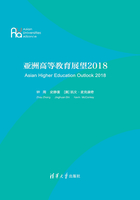
Chapter 6 Entrepreneurial University and Entrepreneurship Education in Asia
Universities are increasingly indispensable in many fields of innovative entrepreneurship. This involves not only an economic process for competitiveness, but also a leadership process for sustainable development.
Accordingly, this chapter explores the characteristics of two AUA members: National University of Singapore (NUS) and Tsinghua University (Tsinghua). Both have taken a proactive role in shaping their environment to inspire, enable, and research entrepreneurship. In recent years, the latest approach to achieving such a proactive role in academic entrepreneurship is through a learning mission of entrepreneurship education for all, from student to faculty and staff, and from alumni to the general public alike.
Both universities have developed an ecosystem of entrepreneurship with five components: a strengthened steering core of special committees for entrepreneurship led by the university presidents, participated by all academic and administrative units, and capable of influencing national policy in academic entrepreneurship; a stimulated academic heartland comprising business and finance schools and design schools; an expanded developmental periphery formed by spin-off enterprises, as well as organizations, associations and networks for entrepreneurship; a diversified funding base mobilizing resources from the industry, government and NGOs at home and abroad; and, an enriched and integrated entrepreneurial culture based on strong culture of engineering and creative design disciplines.
The latest development of the entrepreneurship ecosystems in both universities embraces a learning mission with three characteristics. Reciprocity is achieved through developing a symbiosis between entrepreneurship education and entrepreneurial university through converting university strength in research, public engagement and reputation into educational resources. Boundary permeability is achieved through developing a “crowdsourcing” mechanism by integrating the learning spaces of classroom, campus, and community. Polyvalent knowledge, which is theoretical, practical and interdisciplinary, is achieved through developing an educational philosophy to cultivate entrepreneurship not only in teaching and learning, but also in the processes of research, service, cultural development and international collaboration.
Through innovative entrepreneurship education, these universities (and others as well in the AUA) not only cultivate entrepreneurial spirit and skills, but also directly invest in the students' careers by inspiring, supporting and even creating entrepreneurial careers for students, faculty, staff and alumni. The key is to develop a virtuous ecosystem to inspire, to identity, and to support talents from entrepreneurs-to-be to successful entrepreneurs.